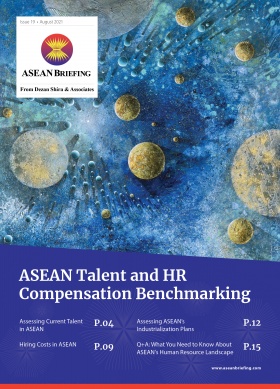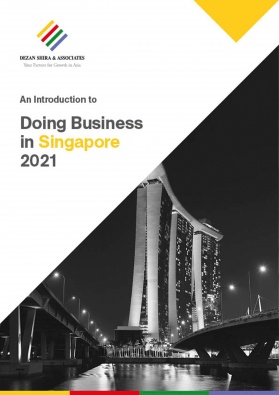Minimum Global Corporate Tax Rate: Implications for Singapore
The Organization for Economic Cooperation and Development (OECD) announced on October 8, 2021, a landmark agreement between 136 countries and jurisdictions to establish a global minimum corporate tax.
The agreement will see participating countries set a minimum corporate tax rate of 15 percent, as governments around the world seek to curb corporate tax evasion. Together, these countries makeup over 90 percent of the global economy and include jurisdictions well known for their low corporate tax rates, such as Singapore, Hong Kong, Ireland, and others.
Historically, Singapore has been a popular location for foreign investors to set up their Asia headquarters in large part to the country’s favorable tax rates. With a global minimum corporate tax rate set to take effect, what will the implications be for investment in Singapore?
What is Singapore’s ‘top-pp tax’? The proposed minimum effective tax rate regime under BEPS 2.0
Broadly speaking, the global minimum tax agreement (the “Agreement”) seeks to modernize taxation for a globalized and digitalized economy. The Agreement has two separate but related goals: reallocate tax rights distribution to where companies actually carry out their business activities and establish a global minimum corporate tax rate to deter the use of offshore tax havens.
Putting more emphasis on actual business activities also aims to reduce corporate tax evasion and the utility of tax havens. This is in tandem with the global minimum corporate tax, which seeks to eliminate the practice of companies registering their headquarters in tax shelters where they conduct little actual business, as well as the incentive for countries to compete with one another on low tax rates.
How has Singapore responded?
Singapore’s tax competitiveness stands to suffer to a degree under the Agreement. The standard corporate income tax rate in Singapore is 17 percent, but numerous incentives and breaks tend to lower this amount in practice. Singapore’s corporate-friendly tax regime led it to be named the ninth largest tax haven in the world in the Tax Justice Network’s Corporate Tax Haven Index 2021.
This has resulted in many multinationals incorporating their Asia headquarters in Singapore and according to the country’s finance minister, Lawrence Wong, about 1,800 multinationals in Singapore would meet the revenue criteria in the Agreement.
The Agreement, however, reached a breakthrough when the text was removed stating that the 15 percent global minimum corporate tax rate would not be increased in the future and that it would not affect small businesses. During negotiations, the US proposed a higher 21 percent minimum rate. These changes offered enough assurance to countries hesitant to increase corporate taxes, including Singapore.
Further, Singapore offers numerous advantages over tax havens like the Cayman Islands and the British Virgin Islands. Singapore has a highly educated workforce, a business-friendly regulatory environment, an independent judiciary, a strong manufacturing sector, and a strategic location for shipping, making it an attractive investment destination for non-tax reasons.
With a global minimum corporate tax in place, countries around the world – including Singapore – will increasingly need to compete in other areas to attract investment.
What is in the agreement?
The Agreement contains two pillars delineating how its two main goals will be carried out in practice.
The first pillar establishes a fairer distribution between countries of the profits and taxing rights of large multinationals.
In other words, highly profitable multinationals will need to re-allocate some of their taxation to where their business activities are generating profits rather than their home countries, even if they do not have a physical presence there. Multinationals with global sales over EUR 20 billion (US$23.1 billion) and a pre-tax profit margin of above 10 percent will see 25 percent of their profit beyond the 10 percent threshold reallocated to market jurisdictions.
The second pillar establishes a global minimum corporate tax rate of 15 percent. It does not stop countries from engaging in tax competition but sets limits on their ability to do so as a means to prevent a “race to the bottom”. The new minimum tax rate would apply to multinationals with annual revenues of more than 750 million Euros (US$866 million). The OECD projects this would generate around US$150 billion in additional global tax revenue every year. Moreover, the OECD expects that it will lead to a more stable international tax system, as countries will not change their tax rates as frequently or to such large extents.
What happens next?
While the 136 participating countries have signed onto the Agreement in principle, each country will need to get the Agreement passed into law by their respective governments.
Participating countries are aiming to sign a multilateral convention in 2022 and implement it in 2023. The OECD will publish model rules for the global minimum corporate tax for participants to base their own laws on.
Signing the Agreement into law in 2022 and implementing it a year later is a short timeframe that many countries may struggle to meet in practice. The ability of the US to pass the Agreement into law will be especially important, given that it is home to many of the world’s largest multinationals.
Although the OECD has maintained that the Agreement will benefit developing countries, many of them are skeptical. The G24 group of developing countries, for example, says that developing countries need a bigger share of reallocated profits for the Agreement to be sustainable.
About Us
ASEAN Briefing is produced by Dezan Shira & Associates. The firm assists foreign investors throughout Asia and maintains offices throughout ASEAN, including in Singapore, Hanoi, Ho Chi Minh City, and Da Nang in Vietnam, Munich, and Esen in Germany, Boston, and Salt Lake City in the United States, Milan, Conegliano, and Udine in Italy, in addition to Jakarta, and Batam in Indonesia. We also have partner firms in Malaysia, Bangladesh, the Philippines, and Thailand as well as our practices in China and India. Please contact us at asia@dezshira.com or visit our website at www.dezshira.com.
- Previous Article The ASEAN-Russia Trade and Investment Cooperation Work Program
- Next Article Indonesia Passes Major Tax Overhaul Bill







